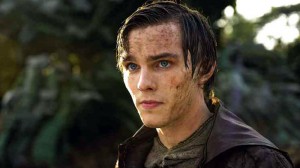Bigness for bigness’ sake
The reenergized popularity of 3D and other blockbuster flicks has made some movie producers think so big that the filmmaking trade has been afflicted with a galloping case of “elephantiasis of the cinema”—!
The most current example of this is “Jack the Giant Slayer.” The original fairy tale told the sweet and simple story of magic beans that, when immersed in water, grew overnight into gigantic beanstalks that made it possible for young Jack to climb way up into the clouds, to the secret kingdom of a race of giants. Period.
In its new filmic form, however, the tiny tale has been radically expanded and adumbrated into a long, overwrought and complicated story that touches on extraneous themes and issues, like female empowerment, class struggle and sundry other “relevant” concerns.
Diversionary tactics
To make the story a natural for expanded screening and viewing, one literally “big” scene follows another, and many digitized characters and visual effects are whipped up to keep viewers entertained. Trouble is, so much attention had been devoted to these diversionary tactics that the production’s more human elements and relationships have been ignored.
Article continues after this advertisementFor one thing, the movie’s storytelling is shot full of holes. Its resident monarch is supposed to be both powerful and wise, and yet he’s too easily fooled by a trusted courtier (Stanley Tucci) who wants to marry his daughter so that he can rule the kingdom.
Article continues after this advertisementFor her part, the princess (Eleanor Tomlinson) is characterized as a women’s libber, but turns out to be similarly powerless to prevent her nasty fiancé from doing his worst.
More to the point, the movie’s lead actors are blandly goodlooking, but otherwise shallow performers who can’t energize their roles with sufficient involvement, insight and empathetic appeal. This includes Nicholas Hoult, the young actor cast in the title role of Jack, who looks like a toothy reject from Central Casting.
With precious few on-screen characters to empathize with, viewers are left to their own devices, occasionally reacting to something gross that the film’s resident race of giants do, but generally just going from one special visual effect to the next, with no organizing theme or interesting plot development to rescue them from all that orgiastic excess.
—So, the audience is a collective victim to the very end of this wearying exercise of—bigness for bigness’ sake.
